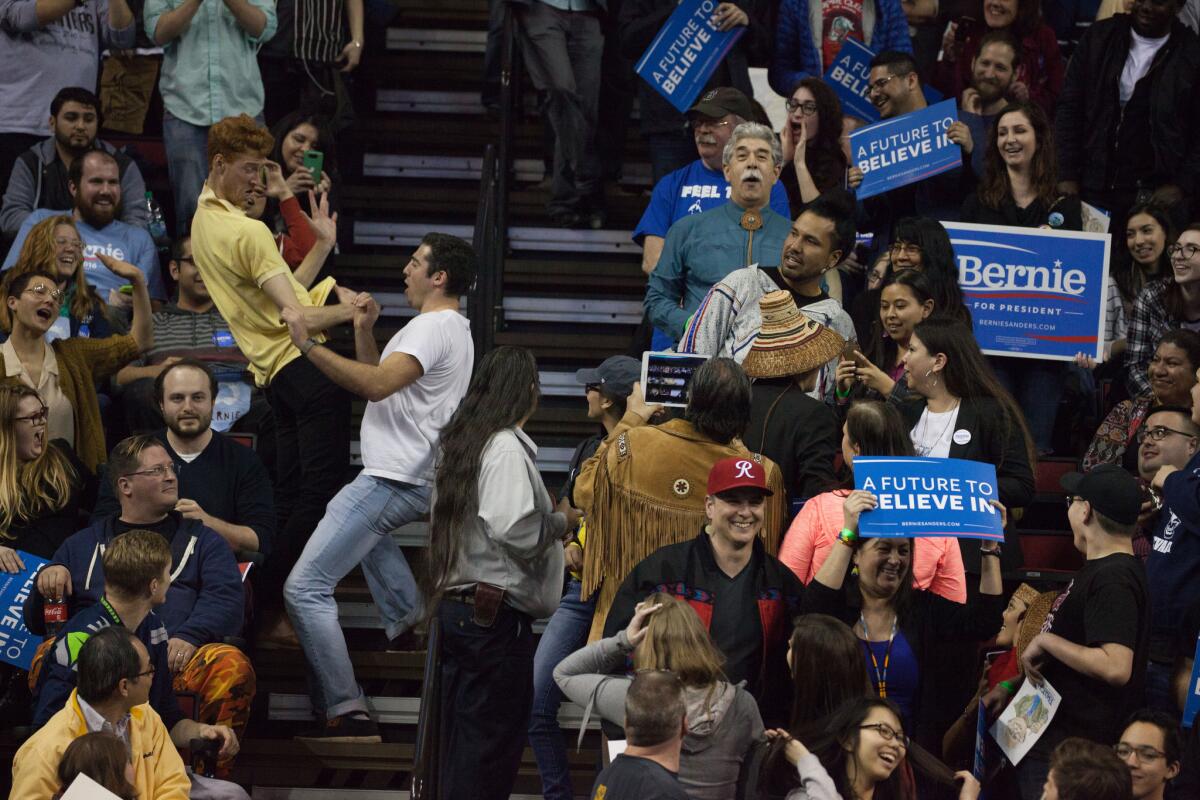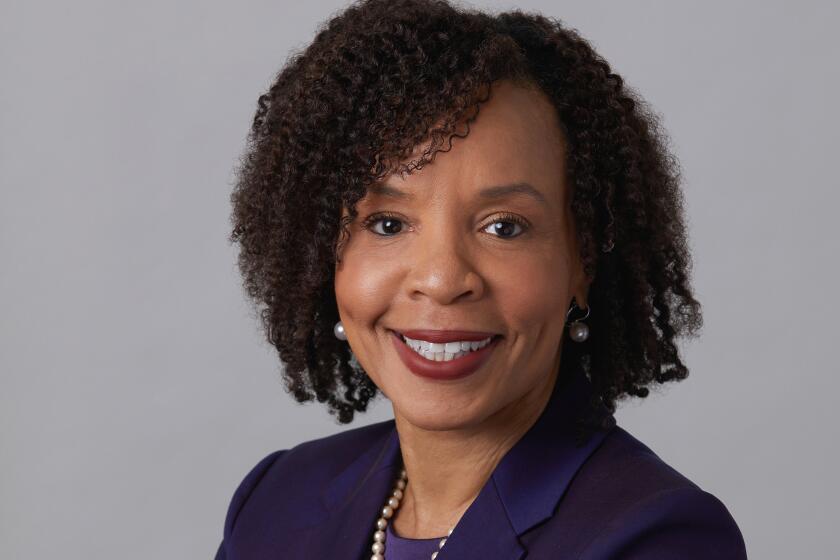Seattle’s progressives see a Sanders win in Washington as a way to send a message to Democrats

Fans dance in the aisles before Bernie Sanders’ arrival at a Seattle rally this week.
When Bernie Sanders’ presidential campaign started hiring staff here in February, operatives found they had more of a head start than they expected.
Sanders activists, working on their own dime, had been training supporters and running phone banks for months, and they provided the candidate’s team with lists of volunteers and offices spaces.
Instead of a loose collection of the Vermont senator’s fans, “it was already a statewide infrastructure,” said Dulce Saenz, the campaign’s Washington director.
As Washington prepares for its Democratic caucuses on Saturday, Seattle’s activists are seizing an opportunity to send a message to a national party they believe has grown too cozy with corporate interests and too dismissive of progressive concerns. In Sanders, they’ve found a candidate as uncompromisingly liberal as they want Democrats everywhere to be.
Election 2016 | Live coverage on Trail Guide | Track the delegate race | Sign up for the newsletter
Some still hope that a victory here could vault Sanders back into close contention for the nomination, despite his struggle to gain ground on front-runner Hillary Clinton. But even if he eventually falls short, many here view Saturday as one step in their long-term effort to prod Democrats further to the left.
“I have conservative Democrats telling me they can sound more like Bernie Sanders so they can appeal to the kind of people he’s activating,” said Mario Brown, a pony-tailed musician, lobbyist and political organizer who helped build the volunteer network for Sanders. “Winning here means more than just some caucus.”
Sitting in the back room of a campaign office in Seattle’s Northgate neighborhood, Brown recalled helping his mother plant yard signs for Michael Dukakis during the 1988 presidential election.
“I said, ‘Why am I doing this?’ She said, ‘You’re a Democrat,’” he said. Now he’s trying to carve out a place for activists like himself who view a more strident party as the key to electing candidates and achieving a sweeping liberal agenda.
“I’ve felt for a while that my voice wasn’t being heard,” he said. “Any time a liberal person wanted to be a Democrat, they were told they were immature, unrealistic and they had to grow up and face reality.”
The Sanders campaign is a vehicle to change that, with a boost from Seattle. No large city has donated more money per capita to the senator, according to a Seattle Times analysis.
A seasoned corps of activists here helped defend same-sex marriage and legalize marijuana at the ballot box in 2012, and the city has already mandated paid sick leave and begun phasing in a $15-per-hour minimum wage.
In addition, economic inequality has become a more tangible issue in Seattle as technology companies like Amazon expand in the city center, driving up prices and sparking concerns about affordable housing.
“Seattle has been having the type of conversations that set the stage for Bernie,” said Robert Cruickshank, a senior campaign manager for Democracy for America, a liberal group that endorsed Sanders.
It’s also the kind of place that doesn’t blink when Sanders identifies himself as a democratic socialist; the City Council already includes a full-fledged socialist who was elected in 2013.
“Even here in Seattle, we look at Denmark, we look at Scandinavia and we think, that’s where we ought to be going,” Cruickshank said.
The passion for Sanders around the country reflects a Democratic base that has already started drifting leftward, driven by demographic shifts and frustration with slow progress in Washington, D.C.
“The national Democratic Party isn’t going to look like the Seattle Democratic Party tomorrow,” said Ruy Teixeira, a senior fellow at the Center for American Progress. “But it’s more natural for them to move that direction than back to the right.”
Sanders rallied in Spokane and Yakima in eastern Washington on Thursday, drawing thousands of supporters, and he scheduled another event in Seattle on Friday.
“If we can do well in Washington, do well in Hawaii, do well in Alaska,” the three states that cast ballots on Saturday, “we have a road to victory,” he said.
But Sanders himself has conceded it’s a “narrow path,” and earlier this week he discussed his hope to still have an impact even if he loses the race.
“If I can’t make it — and we’re going to try as hard as we can until the last vote is cast — we want to completely revitalize the Democratic Party and make it a party of the people rather than one of large campaign contributors,” he told the online liberal news program “The Young Turks.”
Not everyone is interested in finding a way for different factions within the Democratic Party to work together.
Kshama Sawant, the socialist member of Seattle’s City Council, protested at a Clinton rally Tuesday, holding a sign saying “I’m not with her,” a riff on Clinton’s campaign slogan.
Sawant defeated an incumbent Democrat for her seat on the council in 2013, then won reelection in 2015.
“It’s not something in the water we drink here. There’s an opening for a real left alternative, and we’ve demonstrated that it can succeed,” she said in a coffee shop near her home where graffiti on the bathroom wall curses the patriarchy and proclaims “black lives matter.”
Sawant wants Sanders to run as a third-party candidate if he doesn’t get the nomination.
“We have to build a movement against the Democratic Party establishment,” Sawant said. “Hillary Clinton is not an alternative to corporate politics.”
Brown wants a different approach. He frets about people who declare “Bernie or bust,” fearing that could splinter the vote in November and give Republicans a chance to win the White House.
He recalled meeting with young Sanders supporters who didn’t want to consider any other alternative. Brown urged them to stay engaged and keep working within the Democratic Party even if their candidate loses.
“If you give up and go home, they’re not going to come and deal with you,” he told them.
“Is that going to work?” they asked
“That’s how this works,” he said.
Twitter: @chrismegerian
ALSO
Sanders on California’s primary: ‘You’re going to see me here more than you feel comfortable with’
Why winning California’s presidential primary won’t be easy for Bernie Sanders
These Republicans know the presidency shouldn’t be reality TV. But they’ll vote for Trump anyway
More to Read
Get the L.A. Times Politics newsletter
Deeply reported insights into legislation, politics and policy from Sacramento, Washington and beyond. In your inbox three times per week.
You may occasionally receive promotional content from the Los Angeles Times.







